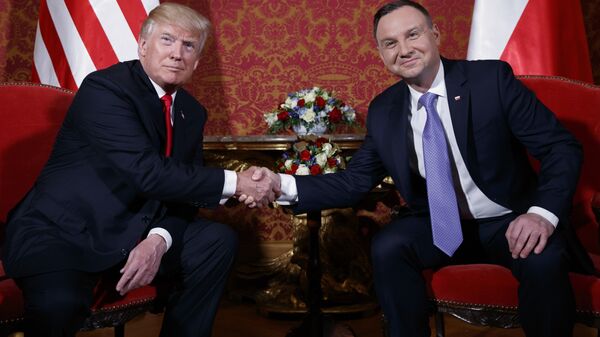Poland’s Prime Minister Mateusz Morawiecki has announced that Warsaw plans to play the role of "informal go-between" in the recent row between the US and the EU over Washington’s withdrawal from the Iran deal.
His statement falls in line with those of the country’s Foreign Minister Jacek Czaputowicz made during the latter’s visit to Washington where the envoy met with US Secretary of State Mike Pompeo. The Polish top diplomat said that Warsaw understood US concerns about the Iran deal regarding “the strategic and security dimension." However he expressed full support for Poland’s allies within the bloc, searching to eliminate negative economic consequences resulting from the US withdrawal from the accord and re-imposition of sanctions against Iran, which could affect those European countries working in the Islamic Republic.
This is yet another step in the Poland-US alignment, which has been growing over the years. The relationship has been accompanied by praise from Warsaw, who has branded military cooperation with the US as a guarantee of the country’s security. Bilateral relations recently reached another high point after Poland signed a deal to purchase US Patriot missile defense system for $4.75 billion this March. The first delivery will include 16 launchers, four radar stations and 208 missiles, which are to be deployed near the border with Russia. The Polish National Defense Ministry didn’t only secure a cost reduction for the US air defense systems, but agreed upon an accelerated delivery time.
READ MORE: 'Poland Wants to Be a Close Ally to US': Scholar on Patriots' Supply Contract
A framework agreement on the delivery of Patriot missile defense systems to Warsaw was signed between the Polish Ministry of National Defense and the US Department of Defense in July 2017 during US President Donald Trump's visit to Poland.
EU Polishing Shield Against Sanctions
In the weeks since Trump’s announcement about the withdrawal from the multilateral accord or 2015 Joint Comprehensive Plan of Action (JCPOA), which lifted sanctions against Tehran in exchange for its shutting down the nuclear program, the EU has been searching for ways to minimize the damage for the continent.
Soon after the announcement, National Security Advisor John Bolton said that the US is not excluding sanctions against EU companies cooperating with Tehran. At the same time, in his speech "After the Deal: A New Iran Strategy" at the Heritage Foundation in Washington, Secretary of State Mike Pompeo warned that any entity conducting business with Tehran would be "held to account" by the US, voicing hope that the new anti-Iranian sanctions would be met with support from US allies beyond Europe. Pompeo believes that US allies will accept the new policy towards Iran as "the right one."
On May 18, the European Commission (EC), who has repeatedly expressed its commitment to the deal, which Trump has denounced as flawed and “worst possible,” launched the formal process to activate the 1996 Blocking Statute by updating the list of US sanctions on Iran falling within its scope. The Blocking Statute prohibits EU firms from adhering to the extraterritorial effects of US sanctions, allows companies to recover damages caused by such sanctions and neutralizes the effect in the European Union of any foreign court decisions related to compliance with restrictive measures, according to the EC.
EU-Poland Tensions Grow
Warsaw has clashed with Brussels on numerous occasions, as the EU has repeatedly criticized the member on its eastern edge for its position on the bloc’s migrant policy as well as recent judicial reform.
In 2017 the Polish parliament adopted a bill which would change the system of appointing Supreme Court judges and allow the dismissal of current judges, with the exception of those nominated by the justice minister. The European Commission started an infringement procedure against it as the law on ordinary courts violated EU legislation regarding judicial independence as well as gender equality, due to different retirement ages for men and women. In December 2017, the European Commission said that it was planning to propose to the Council of the European Union to trigger Article 7(1) of the Treaty on the EU, against Poland. As a result, Poland's voting rights in the European Union could be suspended.
Warsaw and Brussels were also engaged in other disputes in 2017, including the one over the migrant quota system from September 2015 to ease the burden of such countries as Greece and Italy. The system implies relocation of migrants and refugees from the states affected by the migration crisis among the EU’s members. The mechanism has been criticized not only by Poland, but also by Hungary and the Czech Republic. The tensions peaked in December, when the European Commission said it was referring Budapest, Prague and Warsaw to the Court of Justice of the European Union, as these countries had failed to comply with their obligations on the relocation of migrants, after in June, the Commission had launched infringement procedures against the three countries.


